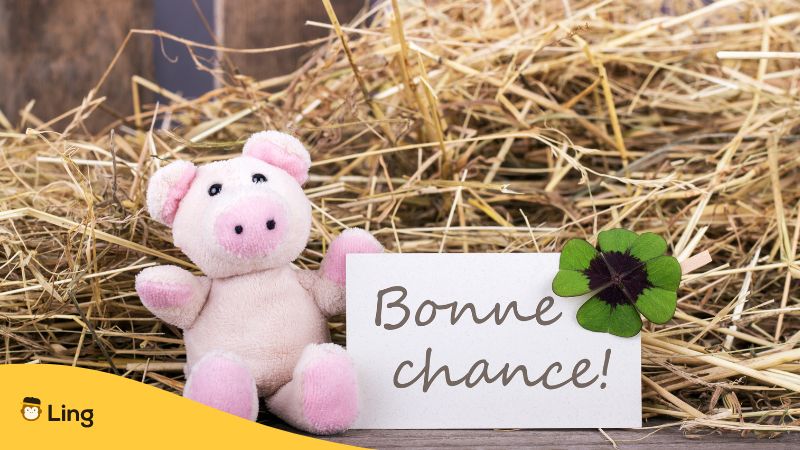Would you like to know how to wish good luck in French? It can happen to have friends about to start a new job, take a new challenge, or face a test.
In addition, if you work with French-speaking colleagues, clients, or partners, it may be necessary to wish them good luck for meetings, presentations, or other business-related events.
Knowing how to do so professionally and culturally appropriately can help build positive relationships and show respect for their customs. This article covers all the great ways to wish someone good luck in French.
How To Wish Good Luck In French
If you have friends, family, or romantic partners who speak French, knowing how to wish them good luck in their pursuits can show that you care and support them. It can also help you express your emotions and feelings.
Giving others the best wishes for their project is also part of good manners and etiquette. Here are some of the best ways to wish good luck in French:
1. Bonne Chance (Good luck)
This is the most common and straightforward way of wishing good luck in French. It is often used in informal situations.
For example:
- Bonne chance pour tes examens de fin d’année ! – Good luck with your end-of-year exams!
- Bonne chance pour ton permis de conduire ! – Good luck with your driving test!
- Bonne chance pour ton entretien d’embauche ! – Good luck with your job interview!
Or you can also say:
- Bonne chance dans ta nouvelle enterprise! – Good luck with your new job!
- Bonne chance dans ton examen de français demain! – Good luck with your French exam tomorrow!
In both examples, “dans” indicates a future event or time frame in which good luck is being wished.
2. Bon Courage (Have Courage/Good courage)
This expression can be used to wish someone good luck, but it specifically means “be strong” or “have courage.”
“Bonne courage” is another French phrase that can be used to offer encouragement and support, but it is not the same as “good luck.” Depending on whom you are wishing luck, you can use this expression instead of “bonne chance.”
Here are some situations where you might use “bon courage” instead of “bonne chance”:
- Before a difficult task
- During a tough time
- In a work context
Here are some examples of how you can use “bon courage” in a sentence:
- Bon courage pour cette journée chargée! – Good luck with your busy day!
- Je te souhaite bon courage pour cette épreuve difficile – I wish you courage for this complex challenge.)
- Bon courage à toi et à ta famille pendant cette période difficile – I wish you and your family strength during this challenging time.
3. Que Le Succès Soit Avec Toi (May Success Be With You)

This translates to “may success be with you” and is a more formal way to wish someone good luck.
This phrase is often used to wish someone success in their endeavors, especially in academic, professional, or personal situations.
Here are some situations where you might use “que le succès soit avec toi”:
- Before an important exam or test
- Before a job interview
- Before a performance
- Before a significant event
4. Je Te Souhaite Bonne Chance (I Wish You Good Luck)
This longer phrase means, “I wish you good luck.” This phrase can be used in various situations with French people where you want to wish someone good luck or success. Here are some examples of when you might use “Je te souhaite bonne chance”:
- Before an exam or test
- Before a job interview
- Before a sports competition
- Before a trip or adventure
5. Que La Chance Soit De Ton Côté (May Luck Be On Your Side)
This translates to “may luck be on your side” and is a more poetic way to wish someone good luck.
6. À Toi De Jouer (It’s Up To You To Play)
“À toi de jouer” is a French phrase that translates to “It’s your turn to play” or “It’s up to you to act.” This phrase can be used to encourage someone to act or decide.
Here are some examples of when you might use “À toi de jouer”:
- For instance, if someone is about to give a presentation or speech, you can use “À toi de jouer” to encourage them to take the stage and deliver their message.
- If someone is about to participate in a game or sport, you can use “À toi de jouer” to encourage them to give it their all and play their best.
- If someone is working on a creative project, such as writing a book or composing a song, you can use “À toi de jouer” to encourage them to keep working hard and bring their vision to life.
- If someone faces a tough decision, you can use “À toi de jouer” to encourage them to trust their instincts and make the best choice.
7. Croisons Les Doigts (Let’s Cross Our Fingers)

This phrase means “let’s cross our fingers” and is a way of wishing someone luck or hoping for the best.
For example:
8. Puisse le sort vous être favorable
This translates to “may fate be in your favor” and is a more formal or literary way to wish someone good luck.
9. Que tout se passe bien (may everything go well)
This phrase means “may everything go well” and can be used to wish someone luck before a specific event or undertaking.
10. Je Touche Du Bois (Knock On Wood)
In French, the phrase “toucher du bois” is the equivalent of the English phrase “touch wood” or “knock on wood.” It is an expression of good luck, and in French, it is commonly used to say “Je touche du bois,” which means “I touch some wood.”
Is The Word Merde A Way To Wish Good Luck In French?
Yes, it’s true that “merde” is sometimes used in French to wish someone good luck, especially in the theater or performance world.
Je te dis merde means literally “go to hell,” but it’s also a way to wish someone luck in French. The idea is that wishing someone “good luck” can bring bad luck, so saying “merde” instead is a way to reverse the jinx and bring good luck.
However, it’s important to note that “merde” is considered a vulgar or swear word in French, so it’s inappropriate for all situations. It’s mainly used in informal or familiar contexts, and it’s not something you would want to say in a professional setting or to someone you don’t know well.
If you wish someone good luck more politely or formally, using one of the other phrases I suggested earlier is better.
Learn French With Ling!

Whether starting from scratch or striving for fluency, the Ling app can be a valuable resource if you want to improve your French skills. This language app offers comprehensive lessons on all aspects of the French language, including grammar, pronunciation, and more.
With the Ling app, you can access over 60 languages from your mobile device or desktop, allowing you to study whenever and wherever you prefer, even while traveling.
Whether you want to enhance your existing language abilities or learn something new, the Ling app can help you achieve your goals. Its user-friendly interface and engaging lessons provide a fun and effective learning experience. Meanwhile, you can learn more about French by reading: Common Animal Names and Compliments In French.
Ready to get started? Download the Ling app for free from the App Store or Play Store and begin your language-learning journey today!



































































